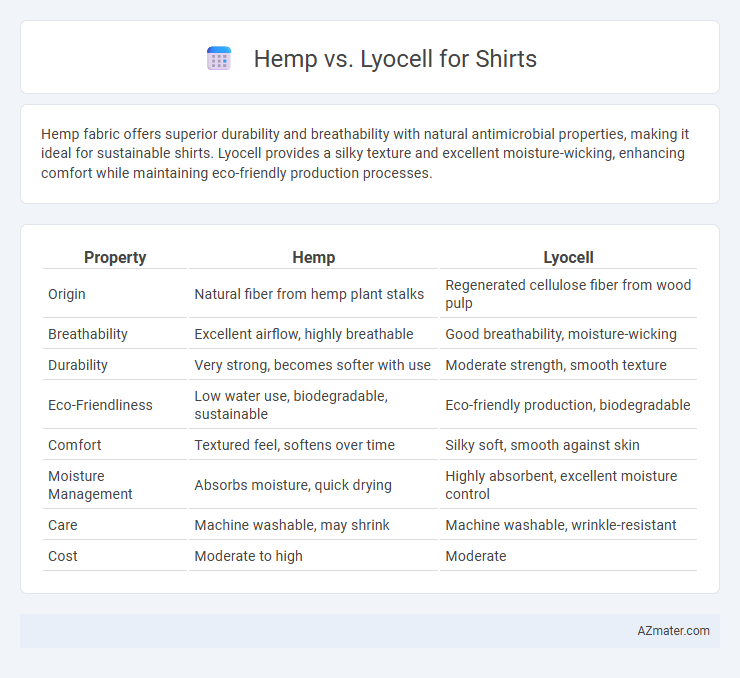Hemp fabric offers superior durability and breathability with natural antimicrobial properties, making it ideal for sustainable shirts. Lyocell provides a silky texture and excellent moisture-wicking, enhancing comfort while maintaining eco-friendly production processes.
Table of Comparison
| Property | Hemp | Lyocell |
|---|---|---|
| Origin | Natural fiber from hemp plant stalks | Regenerated cellulose fiber from wood pulp |
| Breathability | Excellent airflow, highly breathable | Good breathability, moisture-wicking |
| Durability | Very strong, becomes softer with use | Moderate strength, smooth texture |
| Eco-Friendliness | Low water use, biodegradable, sustainable | Eco-friendly production, biodegradable |
| Comfort | Textured feel, softens over time | Silky soft, smooth against skin |
| Moisture Management | Absorbs moisture, quick drying | Highly absorbent, excellent moisture control |
| Care | Machine washable, may shrink | Machine washable, wrinkle-resistant |
| Cost | Moderate to high | Moderate |
Introduction: Comparing Hemp and Lyocell for Shirts
Hemp fabric offers exceptional durability, natural breathability, and antimicrobial properties, making it a sustainable choice for shirts. Lyocell, derived from wood pulp, provides a soft, smooth texture with excellent moisture-wicking capabilities and biodegradability. Comparing these materials highlights hemp's rugged eco-friendliness versus lyocell's silky comfort and moisture management in shirt production.
Fiber Origins: Hemp and Lyocell Explained
Hemp fibers originate from the stalks of the Cannabis sativa plant, known for their strength, durability, and natural resistance to pests and UV light, making hemp shirts highly sustainable and long-lasting. Lyocell fibers are derived from cellulose in hardwood trees, typically eucalyptus, processed through an eco-friendly closed-loop system that minimizes chemical waste and enhances fabric softness and breathability. The plant-based origin of hemp offers robust, coarse textures ideal for rugged apparel, while lyocell's wood-derived fibers create smooth, silky fabrics favored for comfort and moisture-wicking properties.
Sustainability and Environmental Impact
Hemp fabric boasts exceptional sustainability thanks to its low water requirements and rapid growth cycle, making it one of the most eco-friendly fibers for shirts with minimal pesticide use. Lyocell, derived from sustainably sourced eucalyptus wood pulp through a closed-loop process, reduces chemical waste and energy consumption, offering a biodegradable and renewable alternative. Both fibers significantly reduce environmental impact compared to conventional cotton, but hemp generally delivers a lower carbon footprint and greater soil regeneration benefits.
Fabric Durability and Longevity
Hemp fabric is renowned for its exceptional durability and resistance to wear, making it ideal for long-lasting shirts that maintain their strength even after repeated washes. Lyocell, derived from sustainable wood pulp, offers a smooth and soft texture but typically shows less resistance to abrasion compared to hemp, impacting its longevity under heavy use. When comparing fabric durability, hemp consistently outperforms lyocell, providing extended garment life and superior resilience in everyday wear.
Comfort and Breathability
Hemp fabric offers superior breathability due to its naturally porous fibers, making it ideal for moisture-wicking and temperature regulation in shirts. Lyocell, derived from sustainable wood pulp, provides a soft, smooth texture with excellent moisture absorption, enhancing comfort throughout the day. While hemp excels in durability and airflow, lyocell outperforms in silky softness and moisture management, both contributing to a comfortable wearing experience.
Moisture-Wicking and Absorbency
Hemp fibers naturally offer excellent moisture-wicking properties, drawing sweat away from the skin to keep you dry and comfortable, while also providing strong absorbency due to their porous structure. Lyocell, derived from sustainably sourced wood pulp, excels in moisture management by quickly absorbing and releasing moisture, making it highly breathable and soft against the skin. Both fabrics promote comfort in shirts, but hemp's durability and antibacterial qualities complement lyocell's smooth texture and superior absorbency for versatile moisture control.
Style, Texture, and Appearance
Hemp shirts offer a natural, slightly coarse texture that softens over time, providing a rugged yet refined style with excellent durability and breathability. Lyocell shirts boast a smooth, silky texture with a subtle sheen, delivering a modern, sleek appearance ideal for formal and casual wear. Both fabrics excel in moisture-wicking, but hemp's matte finish contrasts with lyocell's lustrous drape, influencing the overall garment aesthetic.
Ease of Care and Maintenance
Hemp shirts are highly durable and resistant to wear, requiring minimal care with simple machine washing and occasional ironing to maintain their texture. Lyocell shirts offer excellent wrinkle resistance and a smooth finish, making them easy to care for with cold water washing and gentle drying to preserve their softness. Both fabrics benefit from air drying and avoiding harsh detergents to extend garment longevity and maintain appearance.
Cost Comparison and Market Availability
Hemp shirts generally cost more than lyocell due to more intensive farming and processing requirements, with hemp fibers priced around $2.50 to $4.00 per pound compared to lyocell's $1.50 to $3.00 per pound. Lyocell benefits from higher scalability and widespread production, making it readily available in global textile markets, whereas hemp remains niche with limited suppliers and fluctuating availability. Market demand for sustainable fabrics is driving growth in lyocell adoption, impacting cost-effectiveness and inventory consistency compared to the emerging but less established hemp shirt market.
Conclusion: Choosing the Best Fabric for Your Shirt
Hemp offers durability, breathability, and natural antimicrobial properties, making it ideal for eco-conscious and long-lasting shirts. Lyocell provides exceptional softness, moisture-wicking capabilities, and a smooth texture, perfect for comfort and a sleek appearance. Selecting the best fabric depends on prioritizing sustainability and ruggedness with hemp or opting for comfort and elegance with lyocell.

Infographic: Hemp vs Lyocell for Shirt
 azmater.com
azmater.com